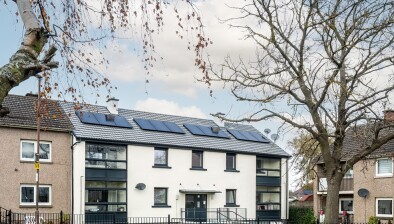Edinburgh housing developers urged to play part in carbon neutral pledge
Edinburgh Council’s housing chief has warned that private housing developers must play their part in building sustainable homes to meet Edinburgh’s aim of reaching carbon neutrality by 2030.

Council officials are drafting a strategy to ensure the authority’s own housing stock is constructed in a more sustainable and energy-efficient way. However, calls have been made for private rented sector developers to make a similar effort in both existing properties and new builds.
The council leader said in June, that to meet the pledge “the future of gas in this city as the primary way we heat our homes will have to change significantly”.
The council’s housing emissions account for about three per cent of the city’s overall emissions. However, council chiefs have failed to identify any alternatives to potentially replace burning gas to heat homes. Yet, Passivhaus ground source heating and district heating could be considered.
Councillor Kate Campbell, the council’s housing, homelessness and fair work convener, said: “If we are going to put very high standards onto social and affordable housing, which we definitely need, we must also recognise that these standards have to be taken up by the private sector, by private developers and by homeowners. If we accept these requirements on social housing, are we putting those requirements automatically onto the private sector – and how would we do that? I think we have to be really balanced about how we go about doing this.”
She also said: “I want our housing to be as sustainable as possible. As a council, we have set incredibly ambitious targets around 2030 which we need to meet. We need to look at all the work that we are doing and what we can ask of the private sector – that has got to form the heart of the discussions that we have. Already, housing standards, carbon emissions and energy efficiency is much higher for affordable housing than it is in the private sector. Council housing stock is at 67% of energy performance at C or B – compared to owner-occupier being at 47% and private rented at 51%.”
Ms Campbell added: “We can already see that we are doing better than the private sector. We need to set standards for ourselves that we can ask other people to adhere to because that’s how we can make a proper impact elsewhere.”
Conservative councillors have also called for future budget strategies for the council’s housing to “include a commentary and financial modelling” to achieve carbon-neutral targets.
Conservative group leader, Councillor Iain Whyte, said: “What we are looking for here is a proper look in a strategic way at things. What we need is the official research and background information and then see that in a planned way against the finances, going forward.”
Alternatively, councillors have agreed that officers should create a report on housing sustainability, while consultants have already been appointed to provide a “route map” for the council to achieve zero carbon targets within its current and new-build homes.
Green councillor, Chas Booth, said: “I do think the approach to this needs to be systematic. There are two specific challenges – one new-build and one existing buildings. There are a number of steps we can take in both of those. The best way to do the new-build is to try and have high standards, both us as a council driving forward high standards but high standards for the whole of the city. I understand there are ongoing discussions about what we as a council can do in best practice in cutting carbon emissions.
“The real challenge is going to be existing buildings. I welcome the change of heart from the Conservatives so I very much hope they will be supporting moves such as minimum efficiency standards for existing buildings at point of sale or rental, which is something the Scottish Government has been discussing for a while.”
He added: “It’s an absolute scandal that we still have fuel poverty in our city. People shouldn’t have to choose between heating and eating.”








